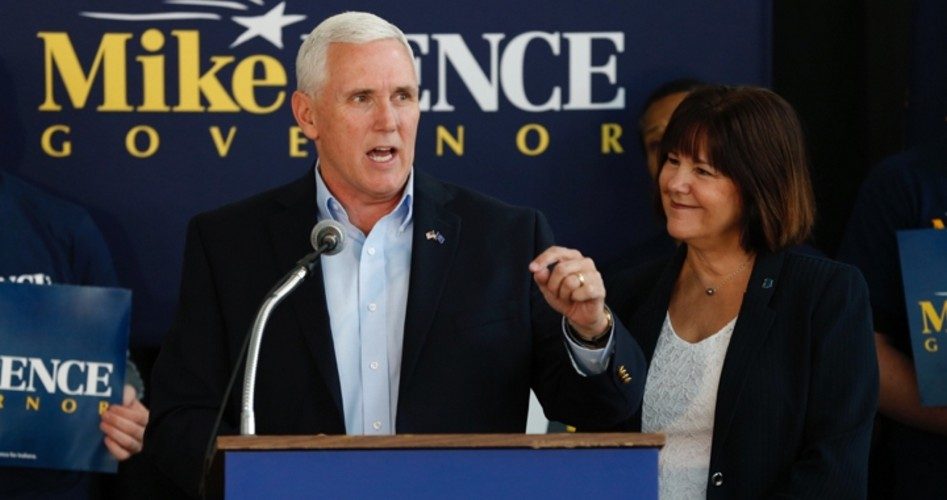
Indiana Governor Mike Pence (shown) met privately with expected Republican presidential nominee Donald Trump this past weekend, raising speculation that the former congressman is on Trump’s short list of potential running-mates.
How should constitutional conservatives view the prospect of Pence in a position that could put him one heartbeat away from the presidency? Like most politicians, including others being considered by Trump, Pence is a mixed bag.
While serving in the U.S. House of Representatives for 12 years, Pence garnered a 62-percent score on the Freedom Index of The New American magazine, which measures members of Congress on fidelity to the Constitution. It’s clear from that percentage that Pence compiled a record in D.C. that would both please and concern supporters of constitutional government.
After graduating from law school at Indiana University in 1986, Pence became president of a free-market think tank, the Indiana Policy Review Foundation, in 1991. He left that position to become a conservative radio talk show host, syndicated on 18 stations throughout the state. During this time, he lost two races for Congress, in 1988 and 1990.
Pence was elected to the U.S. House of Representatives in 2000. In 2006, he failed in a bid for minority leader (the Republicans having just lost control of the lower house in the November elections), with Ohio Representative John Boehner capturing the post. In 2009, he was elected Republican Conference chairman, and also served as the chairman of the Republican Study Committee, a group of conservative House Republicans. He was also a member of the Tea Party Caucus.
In 2012, Pence won the governorship of Indiana, and is up for reelection this year. Among the concerns about Pence is that should Trump tap him as his running-mate, the Republicans would need to find a new candidate to replace him for the general election in the governor’s race. This would have to be done by July 15, to allow party leaders in the Hoosier State to make their selection. So, if Trump plans to name Pence, it will probably be done next week.
A factor in Pence’s favor of being selected is his close relationship with the billionaire brothers Charles and David Koch. They are not enthralled with Trump, and some think this might help the Trump campaign financially. Having both congressional and executive experience is also seen as a plus for a Pence selection.
Another major factor in Pence’s favor is that having served 12 years in Congress, he has compiled a long record of votes, many of which will please the Republican base.
During his tenure, Pence co-sponsored a Spending Limit Amendment to the U.S. Constitution. This proposal would limit federal spending to one-fifth of the American economy, apparently because this is the historical average since World War II. In 1952, Republican Senator Robert Taft offered this same idea, but his proposal limited federal spending to five percent of the U.S. economy. (See this writer’s article in the July 5 print edition of The New American, “Taft vs Eisenhower 1952: The GOP Loses Its Soul.”)
In June of 2006, Pence offered a counter to the various “immigration reform” packages being considered. His was dubbed “no amnesty immigration reform,” and consisted of increased border security, strict enforcement of laws against hiring illegal aliens, and a guest worker program. While some conservative leaders, such as former Congressman Dick Armey, hailed Pence’s plan as a good alternative to the Bush amnesty proposals, others, including Phyllis Schlafly and Tom Tancredo, voiced criticisms. Pat Buchanan even described it as “stealth amnesty.”
While in the House, Pence argued that “Congress should oppose any effort to recognize homosexuals [as] entitled to the protection of anti-discrimination laws similar to those extended to women and ethnic minorities.” He opposed the inclusion of homosexuals in the military, saying, “Homosexuality is incompatible with military service because the presence of homosexuals in the ranks weakens unit cohesion.” He also opposed the Matthew Shepard Hate Crimes Act, saying that Obama wanted to “advance a radical social agenda.” He feared that the law could lead to pastors being “charged” or made “subject to intimidation for simply expressing a biblical worldview on the issue of homosexual behavior.” He opposed both same-sex marriage and same-sex civil unions.
Some of Pence’s other votes that would please most conservatives are his repeated efforts to defund Planned Parenthood, his vote to extend the Bush tax cuts, repeated votes to repeal ObamaCare, support for the Keystone XL Pipeline, opposition to raising the debt limit, prohibition of new rules from the Environmental Protection Agency on “farm dust” as a supposed pollutant, the prohibition of federal funding to purchase health insurance plans covering abortion, a vote to allow the continued production and use of incandescent light bulbs, the removal of bureaucratic controls on offshore drilling in the Gulf of Mexico, and his opposition to a bill giving new powers to the Federal Reserve System.
Strongly pro-life, Pence would certainly reassure social conservatives who have concerns about Trump’s dedication to that issue.
Since leaving Congress, Pence has been among the many governors fighting the Obama administration over the placement of Syrian refugees in his state.
Alas, not all is positive for conservatives with Mike Pence.
Pence voted for the joint resolution authorizing military action against Iraq, which delegated the constitutional power of Congress to declare war, leaving it up to President Bush when and if to go to war.
Non-interventionist conservatives would likely be concerned about Pence’s foreign policy. He has voted to continue funding the United Nations, and to reauthorize the Export-Import Bank. He also voted “no” on an amendment to a bill to prohibit the use of funds for military operations in or against Libya, except in case of a congressional declaration of war.
A related area of concern is Pence’s stance on civil liberties. He voted in 2012 to reauthorize the Foreign Intelligence Surveillance Act (FISA), allowing warrantless surveillance of foreign targets who may be communicating with people inside the United States, provided the FISA Court approves of the surveillance procedures.
Pence also voted “no” on an amendment to eliminate military detention without trial under the National Defense Authorization Act (NDAA), and he voted to extend the PATRIOT Act.
As governor of Indiana, Pence signed into law the Indiana Religious Objections legislation, which was designed to protect religious freedom in the state. Opponents, however, charged that the law would permit discrimination against LGBT persons. Indiana was then faced with the typical secular progressive anti-Christian campaign that has been seen in other states, such as North Carolina. Organizations as diverse as the NCAA and the Disciples of Christ criticized the law, and Tim Cook, CEO of Apple, even added his condemnation. Angie’s List announced they would cancel a $40 million expansion of their Indianapolis-based headquarters because of the law.
At first, Pence staunchly defended the bill, telling George Stephanopoulos of ABC News, “We are not going to change this law.” But, soon after, he signed legislation revising the law to alleviate concerns over “potential discrimination.”
One would hope he would be tougher as a president, were that to fall to him.
If Governor Mike Pence becomes the vice-presidential nominee of the Republican Party, and then gains the vice-presidency, conservatives will have to take the bad with the good with Vice President Mike Pence.
Photo: AP Images



